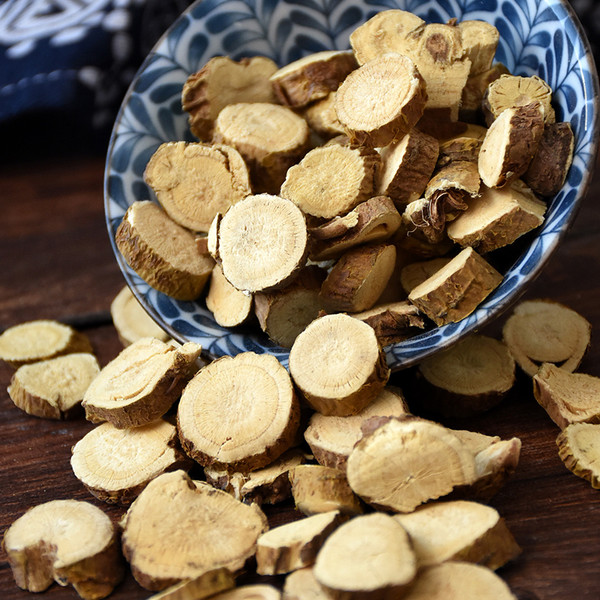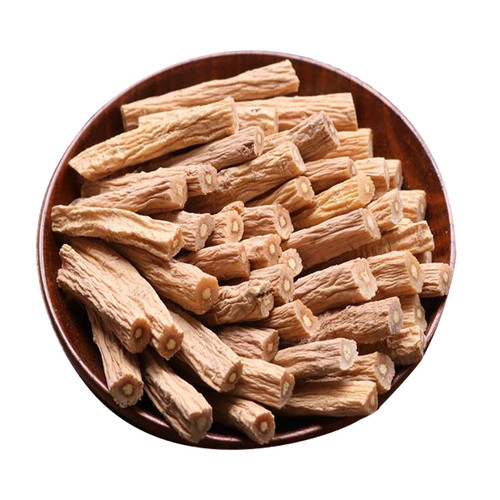Product Overview
Parts used: Dried root
TCM category: Herbs that clear Heat and dry Dampness
TCM nature: Cold
TCM taste(s): Bitter
Meridian affinity: Bladder Stomach Heart Large intestine Liver
Scientific name: Sophora flavescens
Other names: Shrubby sophora
Use of sophora roots (Ku Shen) in TCM
Please note that you should never self-prescribe TCM ingredients. A TCM ingredient is almost never eaten on its own but as part of a formula containing several ingredients that act together. Please consult a professional TCM practitionner, they will be best able to guide you.
Preparation: Remove the smaller roots, wash, soak thoroughly in water, cut into thick slices, dry.
Dosage: 3 - 12 grams
Main actions according to TCM*: Expels Damp-Heat. Scatters Wind and relieves itching.Promotes urination and expels Heat. Kills parasites. Applied externally for Damp-Heat.
Primary conditions or symptoms for which sophora roots may be prescribed by TCM doctors*: Dysentery Hematochezia Jaundice Oliguria Leukorrhea Eczema Sores Rashes Scabies Carbuncles Vaginitis Urinary tract infection Ringworm
Contraindications*: This herb should not be used by those with weakness and Cold in the Spleen and Stomach. This is a toxic herb, it should be used with care and prescribed by professional TCM practitioners.
Common TCM formulas in which sophora roots are used*:
For urinary infections during pregnancy combine sophora roots with dong quai (Dang Gui) and fritillary bulbs (Chuan Bei Mu).
For fungal diseases associated with pruritis and itching combine sophora roots with dittany root bark (Bai Xian Pi).
Key TCM concepts behind sophora roots (Ku Shen)'s properties
In Traditional Chinese Medicine (TCM), sophora roots are plants that belong to the 'Herbs that clear Heat and dry Dampness' category. Herbs in this category are used to clear inflammatory and infectious conditions, referred to as 'Internal Heat' in TCM. This is why most of the herbs in this category will have both antibacterial and antiviral properties. In TCM one has too much 'Heat' in their body as a result of a deficiency of 'Yin' (which is Cold in nature, see our explanation on Yin and Yang) or, more commonly, an excess of Yang (Hot in nature). Herbs that clear Heat and dry Dampness treat the latter while, at the same time, relieving the body of excess Dampness. As such they tend to be Cold or Neutral in nature.
As suggested by its category sophora roots are plants that are Cold in nature. This means that sophora roots typically help people who have too much "heat" in their body. Balance between Yin and Yang is a key health concept in TCM. Those who have too much heat in their body are said to either have a Yang excess (because Yang is Hot in nature) or a Yin deficiency (Yin is Cold in Nature). Depending on your condition sophora roots can help restore a harmonious balance between Yin and Yang.
Sophora roots also taste Bitter. The so-called "five elements" theory in Chinese Medicine states that the taste of TCM ingredients is a key determinant of their action in the body. Bitter ingredients like sophora roots tend to have a cleansing action on the body by clearing heat, drying dampness and promoting elimination via urination or bowel movements.
The tastes of ingredients in TCM also determine what organs and meridians they target. As such sophora roots are thought to target the Bladder, the Stomach, the Heart, the Large intestine and the Liver. In TCM the impure water collected by the Kidneys that cannot be used by the body is sent to the Bladder for storage and excretion as urine. The Stomach on the other hand is responsible for receiving and ripening ingested food and fluids. It is also tasked with descending the digested elements downwards to the Small Intestine. In addition to regulating blood flow, the Heart is believed to be the store of the "spirit" which basically refers to someone's vitality. The Large Intestine receives the "impure" parts of the digested food from the Small Intestine, absorbs the remaining fluids and excrete the remainder as feces. The Liver is often referred as the body's "general" because it is in charge of regulating the movements of Qi and body fluids. It also takes a leading role in balancing our emotions.








